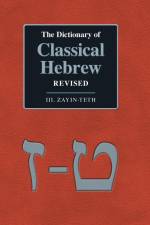av David Ja Clines
2 385,-
The third Volume of The Dictionary of Classical Hebrew Revised, Zayin-Teth, arrives 27 years after the publication of the corresponding volume in the first edition (DCH) in 1996. Readers will find in the present volume some 32% more words (lemmas) than in the original 3rd volume, amounting to 40% more material, which consists of many thousands of additions and corrections, references to the multitude of Dead Sea Scrolls texts and inscriptions published since 1996, and a much expanded Bibliography.The nine volumes of DCHR were originally expected to be published at intervals of approximately one year, after the first volume in August 2018. There was, after the second volume, in 2019, a pause until now. From 2019 to 2022 David J.A. Clines, prior to his final illnesses and death:completed every necessary editorial task for the future volumes;oversaw the preparation of and collation of most materials;and provided the means by which the project Research Associate, David Stec, could bring the remaining volumes to completion between 2023 and 2028.David Clines wrote the Preface for this volume and David Stec completed all outstanding work including the final collation of the sets of synonyms.The Dictionary of Classical Hebrew Revised, when completed, will contain more than 6,420 Hebrew words not in BDB, and will refer to many newly published texts, including 540 Dead Sea Scrolls and 4,000 ancient Hebrew inscriptions. New features in DCHR include: a notation of 4,285 byforms (words with the same meaning and similar form) identified for the first time; 717 verbal nouns (nouns derived from a verb) with their own articles (not previously shown in Hebrew lexica), 345 denominative verbs (verbs derived from a noun), and the semantic field to which every word belongs (a totally new feature for Hebrew dictionaries).Data on synonyms have been greatly expanded, and loanwords from other languages included. Articles on personal names show (for the first time) all short forms, long forms, and alternative forms of each name, the Bibliography has been updated and expanded, and 35,000 emendations of biblical texts noted.Every occurrence of each word in Classical Hebrew is noted. All the subjects and objects of verbs are listed, and the verbs used with each noun, as well as all nouns used in a construct (genitive) relation with another noun. As with DCH, every Hebrew word in the revised Dictionary (except for the variant forms of a word, the byforms and the sections on synonyms) is followed immediately by an English translation, so that the Dictionary can be easily understood by a person with little or no Hebrew. Among the resources that have been reviewed for the present volume are: philological studies on Hebrew words, such as Aitken on blessing and cursing, Koller on tools, and Peters on cooking;handbooks on loanwords from other languages, such as Noonan on non-Semitic words, Mankowski on Akkadian and Muchiki on Egyptian loanwords;treatments of realia such as Borowski on agriculture and animals, Musselman on plants and Wiggins on weather;collections of inscriptions such as the second volume of Davies on Hebrew inscriptions, Lifschits and Vanderhooft on Yehud stamp impressions and Deutsch on Hebrew bullae and biblical period epigraphy.The Bibliography itself, with over 4,000 entries, an average of 30 items- merely on words beginning Zayin to Teth-for each of the last 120 years, testifies to the vitality of scholarship on the Classical Hebrew language.

